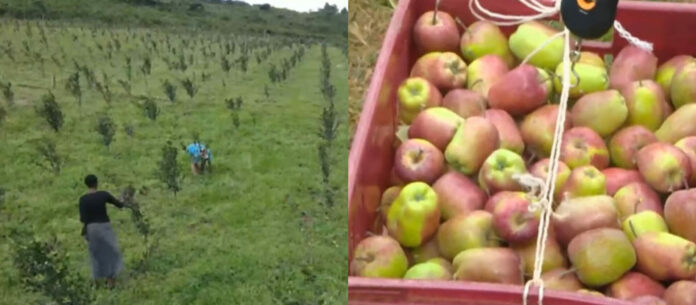It is no longer a secret that some Kenyan universities have been struggling with huge debts that pose a threat to their daily operations.
In 2022, Moi University was wallowing in debt of over Sh. 5 billion as government funding to the institution continued to shrink.
To address these financial challenges, Moi University sought to venture into apple farming as a means of generating additional funds to supplement exchequer funding.
The university established a strategic partnership with Wambugu apples, Kenya’s very own Sub-Saharan apple variety. 100 acres of neighbouring land in Kesses is filled with Wambugu apple trees, courtesy of Moi University.
Previously, Moi University stated that they had engaged Wambugu on breeding rights, in a bid to improve the apple variety through research.
“We want to improve on the variety through research so that it can breed for different climatic conditions. We are also saying that we can reduce the maturity time from 12 months to 9 months,” said Dr. Humphrey Njuguna.
Speaking to Kenya’s Gold on Citizen TV, Professor Ambrose Kiprop noted that the farming venture on the school’s orchard is a means to help the institution become liberated financially.
Cate Wambugu, ambassador of Wambugu Apples, said that the institution cleared forested land to pave the way for apple farming. This has now turned out to be a success.
Nevertheless, the professor explained that the venture has faced its fair share of challenges, such as low rainfall resulting in less than a 100% survival rate for the seedlings.
Wambugu Apples have gained popularity in the African market, attracting interest from farmers on a local and international scale. The plant is known for its high production rate and relatively low maintenance.
“The money is here. It is so easy to manage it, you just need to do the manure and watering,” said Cate Wambugu, adding that after 9 months, one can begin harvesting.
Moi University uses organic manure in the cultivation of Wambugu Apples, targeting both the local and international markets. Notably, Kenya currently imports a huge chunk of its apples worth $17.9 million.
In 2021, the institution had projected to be making sales of over Sh. 80 billion per acre, in 4 years, from the apples.
“It might sound like we are out of this world, but we have done our due diligence. This way, we will get our university out of financial ICU,” Dr. Njuguna maintained.
Wambugu’s seedlings are sold at Sh. 1,000 per seedling. The initial investment in purchasing the seedlings will be recovered within one year.
It has a life span of over 80 years and the market for Wambugu Apples is readily available.
The pioneers of Wambugu Apples are optimistic about the future of the apple market in Kenya. They are considering value addition by venturing into the production of juices and apple cider.








